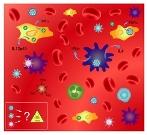Israeli researchers use nanotechnology to target drug-resistant ovarian tumors
“Tumors become resistant very quickly. Following the first, second, and third courses of chemotherapy, the tumors start pumping drugs out of the cells as a survival mechanism,” said Peer. “Most patients with tumor cells beyond the ovaries relapse and ultimately die due to the development of drug resistance. We wanted to create a safe drug-delivery system, which wouldn’t harm the body’s immune system or organs.”
Peer and his colleagues saw a 25-fold increase in tumor-accumulated medication and a dramatic dip in toxic accumulation in healthy organs using the new therapy. Peer chose to tackle ovarian cancer in his research because his mother-in-law passed away at the age of 54 from the disease. “She received all the courses of chemotherapy and survived only a year and a half,” he said. “She died from the drug-resistant aggressive tumors.
“At the end of the day, you want to do something natural, simple, and smart. We are committed to try to combine both laboratory and therapeutic arms to create a less toxic, focused drug that combats aggressive drug-resistant cancerous cells,” said Peer. “We hope the concept will be harnessed in the next few years in clinical trials on aggressive tumors.”
Viva Sarah Press

